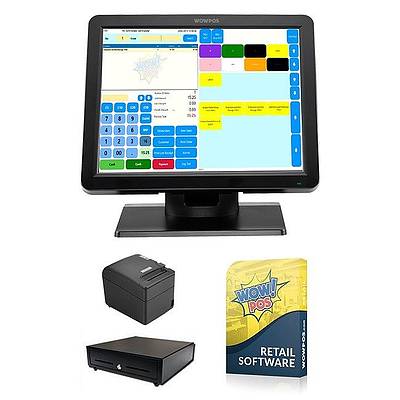They provide much more utility due to the wide variety of EPOS systems available. Their functions start from sales accounting and reporting to staff management and inventory. EPOS products can also produce loyalty programs for your customers and help you evaluate your business’s future trends. It is the central tool for your company, so get aware of your options before choosing one and then make an investment.
EPOS (Electronic Point of Sale) system consists of hardware and software. It permits your business to control your sales more effectively. The EPOS products are manufactured in a way that helps you control all the different aspects of your business at the same time. You can manage order processes, stock control, distribution, and pricing of items. You can tailor the software according to your business requirements and its customary and primary functions.
EPOS Hardware and Software
EPOS Hardware includes:
- a cash drawer
- barcode scanners
- Chip and Pin devices (PDQ machines)
- a central computer terminal
- receipt printers
EPOS software features include the following:
- e-commerce integration
- sales tracking
- accounting
- purchase and order processing
- creating and managing staff schedules
- stock availability management
- customer relationship management (CRM)
Tips for choosing the right EPOS system
The investment in the EPOS system can be expensive for many business owners, but it enhances the business’s overall performance to justify the investment. You need to have a look at the following points before choosing one.
1. Unique needs of your business
You need to consider your business needs. Every industry and every company within the industry has unique requirements. It would help to prioritise which department needs to focus on and which process needs to be improved. If you already have set up your method of doing stock checks, accounting, staff management and sales forecasting. However, you need to accomplish the process using a centralised system efficiently. That, in return, helps you bail out some extra time, prevent you from taking erroneous decisions, and save you from spending on unnecessary cause.
2. Transactions Process
You need to think about how you would like to carry out the transaction process. Do you prefer a touchscreen or barcode reader? You can select your payment processor, which depends on the EPOS provider. You can also combine your choice of a payment processor, which can pair with your EPOS system.
3. Monitoring stock level
It may be daunting always to notice the inventory. The automated reminders can help you remember if products are scarce. The EPOS system checks out the stock for you and can predict the future position of your business. It can help you to take steps before the situation becomes critical. Your customers would be satisfied with your effective stock control method.
4. The Future of the Business
Choosing the right EPOS system for your business should be a long-term investment. You cannot replace the existing one with a new one every time. You need to analyse the following queries. Does your business need to change in time? Do you need to combine all your new sales channels? Do you have any plan on expanding your offer? All these queries can answer whether the system would support all future changes.
5. Mobile POS
The retailers at trade shows or places with limited floor space have started having smartphones or tablets to carry out POS services. This feature optimises customer satisfaction and experience and avoids long waits at the cashier. Businesses have also started ordering from mobile devices and new innovative ways of displaying products. These efficient unique aspects of the business need to be suitable for the EPOS system you may plan to buy.
6. Data Security
Your EPOS system highly prioritises the precaution of unauthorised entry into your system for your business and customers. You need to have a robust system for protecting data like the clients’ personal data regarding credit card information.
7. Cloud Backup
You can install the EPOS software in two ways: either onto your terminal or cloud-based. The cloud-based processor gives an advantage of real-time reporting. It also provides the propensity to retrieve the data from any location. If you are the owner of multiple stores, the cloud-based backup can bail out much time. The stored data in the cloud is ciphered and secured.
8. Installation
You do not need the help of a professional to install the system. You can set up the system all by yourself. Hiring an installer depends on your budget and the size of your business.
Ending Thoughts
Now you know that a robust EPOS product is an essential tool for your business. The coexistence of all the processes is crucial for your business. EPOS system is a single platform that permits you to access a wide range of data from any location, and you can control them from anywhere. Both management and customer appreciate the system being more efficient and cost-effective.
